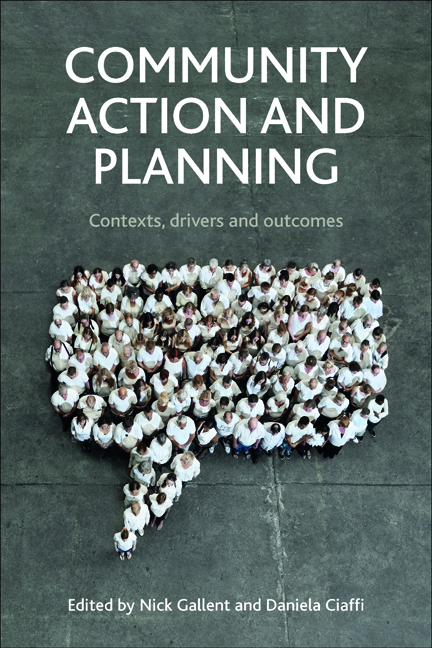Part 4 - Scales, influence and integration
Published online by Cambridge University Press: 04 March 2022
Summary
The experience in many countries is that community action and planning should not automatically be viewed as an attempt to shape the policy environment or to influence political decision-making. Those engaged in such action are often motivated by a desire to achieve outcomes on their own, without the strings that are often attached to external support. However, because of the political and professional desire to secure legitimacy (often in a context of frustration with representative forms of democracy) by connecting in some way to the ‘grass roots’, and also because of a recognition that the wider political and policy environment presents place-based communities with particular risks and opportunities, there is a tendency for those communities to seek influence and governments to pursue the integration of community inputs into broader governance processes. Connection across different scales, and the attempt to bridge the private interests of community actors with sometimes abstract notions of the public good (see Chapter 1), throws up a number of challenges. The case studies that follow try to address the issues of scale, influence and integration in planning and the design of public policy.
There are three chapters in this part of the book. Reflecting on experiences in Canada, Filion begins by examining the necessarily ‘integrative nature of planning’ and what this means for planning across different scales. He examines issues of scaling by taking a transect from the province of Ontario, through the city of Waterloo and down to a neighbourhood organisation. He observes that ‘scaling fosters the emergence of communities of interest specific to each scale’ and that the interaction of these communities determines the extent to which messages are clearly communicated up and down and whether interventions at the top are shaped by aspirations at the bottom. This chapter provides a general critique of scaling in planning, applied here to the wider decision-making environment in which community or neighbourhood organisations find themselves. The remaining chapters then consider how community action engages with the scale issue: in Chapter 15, Amdam brings different actors and scales together in a depiction of Volda (Norway) as a complex adaptive system, arguing that the effects of scale can be nullified where there is a genuine devolution of power to community actors; that, essentially, there are decisions that are best made at a community scale though ‘self-governed community development’.
- Type
- Chapter
- Information
- Community Action and PlanningContexts, Drivers and Outcomes, pp. 259 - 260Publisher: Bristol University PressPrint publication year: 2014



